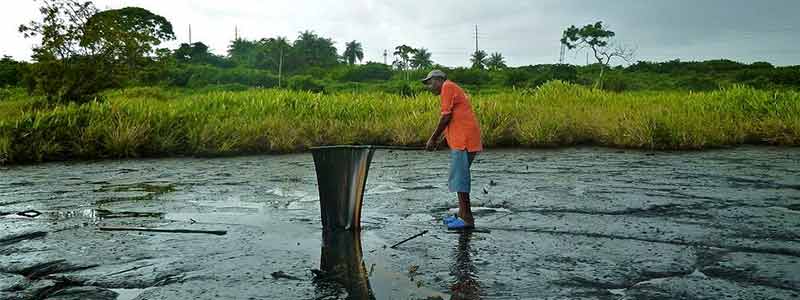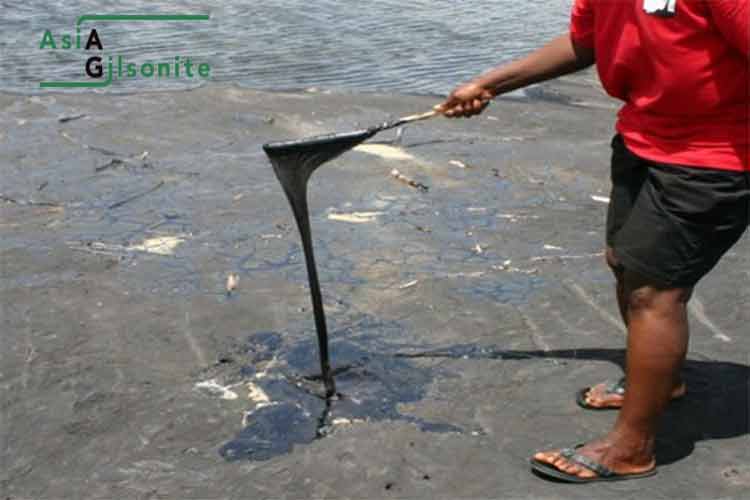Natural lake asphalt is a geological formation where crude oil seeps to the surface and forms a natural lake of asphalt. These bodies of asphalt are usually found in areas with tectonic activity, such as near fault lines or on the edges of tectonic plates.
Natural paving asphalt lakes have been used for thousands of years by cultures around the world for various purposes. Here, we’re going to explore more about these natural lakes, their properties, uses, and the best ones around the world.
What Is Natural Asphalt Lake
As we mentioned in the introduction, natural lake asphalt is a geological formation where asphalt, also known as bitumen, has seeped up to the surface and accumulated in a natural depression or basin. These lakes are very rare and are found in only a few places around the world.
Natural asphalt lakes are formed when crude oil, which contains a high percentage of bitumen, migrates up through the earth’s crust and becomes trapped in a depression or basin. Over time, the lighter components of the crude oil evaporate, leaving behind the heavier bitumen.
The asphalt in these lakes is typically very viscous and sticky, and has a high concentration of asphaltenes, which are complex hydrocarbon molecules. Asphalt can be used in a variety of applications, including road construction, paving asphalt, roofing, providing natural asphalt rock, waterproofing, and has been used for thousands of years by indigenous peoples for various purposes.
Natural lake asphalt is also of great scientific interest, as it provides a unique opportunity to study the ecology and evolution of organisms that have become trapped in the asphalt. Many well-preserved fossils of plants and animals have been discovered in these lakes, providing valuable insights into the natural history of the region.
Natural Asphalt Lake Characteristics and Properties
Natural asphalt lakes, also known as tar pits or asphalt pits, have unique characteristics and properties that make them distinctive from other types of bodies of water. Some of the typical characteristics and properties of natural lake asphalt include:
Appearance
Asphalt lakes are thick, black, and sticky, with a distinctive odor. The surface of the lake may be covered with a layer of asphalt or bitumen, which traps and preserves organic materials.
Composition
Natural asphalt lakes are made up of a mixture of heavy hydrocarbons, such as asphaltene and resin, and lighter hydrocarbons, such as methane and ethane. The exact composition of the asphalt varies depending on the source of the hydrocarbons.
Viscosity
The viscosity of asphalt varies depending on the temperature. At warmer temperatures, asphalt is more fluid, and at cooler temperatures, it is more solid.
Preservation
The sticky nature of lake asphalt has led to the preservation of fossilized remains of animals and plants. The La Brea Tar Pits, for example, contain numerous well-preserved fossils of prehistoric mammals, including giant sloths and saber-toothed cats.
The Applications of Natural Asphalt Lake
There are several applications of natural asphalt lake, some of which are:
Road Construction
The natural asphalt lake is used in road construction as an asphalt binder. It is mixed with aggregates to form paving asphalt concrete, which is used for roads, pavements, and airport runways.
Waterproofing
Waterproofing is another application of lake asphalt in which it is used as a waterproofing material for roofs, basements, and swimming pools.
Adhesives
Adhesion is one of the unique properties of natural asphalt lakes that makes it an ideal choice for adhesives in the manufacturing of tiles, carpets, and wallpapers.
Paints and Coatings
Using as a key ingredient in paints and coatings to improve weather resistance, durability, and water repellency is another application of natural asphalt lakes.
Emulsions
Asphalt lakes is utilized to make emulsions, which are used in the manufacturing of bitumen emulsions, soil stabilizers, and dust suppressants.
Pipe Coating
Pipes are crucial pieces in infrastructure development. They have to be coated to become resistant to corrosion, and natural asphalt lake is the best material for this mission.
Soundproofing
Last but not least, the natural asphalt lake is used as a soundproofing material in buildings and automobiles.
The Best Natural Asphalt Lakes in the World
Natural asphalt lakes are found in different locations all around the world. Here are the best lake asphalt worldwide:
Seymareh Asphalt Lake
It is located in the Zagros Mountains in western Iran and is one of the largest natural asphalt lakes in the world. It is estimated to contain around 4 million tons of asphalt.
Shiraz Asphalt Lake
It is located in the Fars Province of Iran and is known for its high-quality paving asphalt. It has been used for commercial purposes for a long time.
Bermudez Asphalt Lake, Venezuela
Bermudez Asphalt Lake is located in eastern Venezuela and is one of the largest natural asphalt lakes in the world. It is believed to contain around 15 million tons of asphalt.
Tierra del Fuego, Argentina
Tierra del Fuego is an archipelago located at the southern tip of South America, shared by Argentina and Chile. The area has several natural lake asphalt deposits, including the Lago Fagnano and Lago Escondido lakes.
Kuh-e-Namak Asphalt Lake
It is located in the Dasht-e Kavir desert in central Iran. The lake is relatively small, but it has been used for a long time for different commercial and trade purposes.
Chapala Lake, Mexico
Chapala Lake is the largest lake in Mexico and is located in the state of Jalisco. The lake contains significant amounts of asphalt and has been mined and traded since the 19th century.
Has Ansu Asphalt Lake, Azerbaijan
Has Ansu Asphalt Lake is located in the western part of Azerbaijan and is one of the largest natural lake asphalts in the world. It may contain around 6 million tons of asphalt.
Kharaa-Nur Lake, Mongolia
Kharaa-Nur Lake is located in northern Mongolia and is one of the few natural asphalt lakes outside of the Americas and the Middle East. It was explored in the 20th century and has been used in many industries since then.
Zinda Pir Asphalt Lake, Turkmenistan
Zinda Pir Asphalt Lake is located in the Karakum Desert in Turkmenistan and is one of the largest natural asphalt lakes in the world. It’s said that 5 million tonnes of asphalt could be mined out of this natural lake.
Qara Su Asphalt Lake, Turkey
Qara Su Asphalt Lake is located in the eastern part of Turkey and is one of the largest natural asphalt lakes in the world. It may contain about 6 million tons of asphalt.
Conclusion
Natural asphalt lakes are geological formations that are rare and unique, with distinctive characteristics and properties that make them useful for various applications. Today, lake asphalts are used in road construction as paving asphalt, waterproofing, and more. Through the study of natural asphalt lakes, we gain valuable insights into the natural history of the region and discover new ways to utilize this unique resource.






